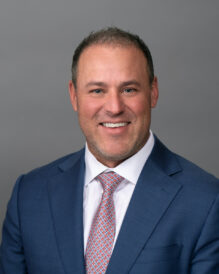<!–
- Utah Rep. Mike Schultz, R-Hooper.
- Great Salt Lake Collaborative

Photo supplied, Utah House
Utah Rep. Mike Schultz, R-Hooper.
Editor’s note: This article is published through the Great Salt Lake Collaborative, a solutions journalism initiative that partners news, education and media organizations to help inform people about the plight of the Great Salt Lake — and what can be done to make a difference before it is too late. Read all of our stories at greatsaltlakenews.org.
OREM, Utah — House Speaker Mike Schultz reacted with some concern about a new scientific study that claims a neurotoxin that may contribute to ALS has been found inside dust blowing off the Great Salt Lake.
“I just want to point out it’s not conclusive so we don’t know 100% for sure,” he told FOX 13 News on Thursday. “But what we do know? It’s not healthy.”
The report added pressure on Utah’s elected leaders to save the Great Salt Lake.
“Dust itself is bad for you. What may be in the dust is alarming. We need to take it very seriously,” said Dr. Brian Steed, the Great Salt Lake Commissioner who was appointed to come up with a holistic plan to save the lake by state leaders.

Great Salt Lake Collaborative
Dr. Steed is preparing a report for Governor Spencer Cox and legislative leaders due to them at the end of this month. He told FOX 13 News one recommendation will be increased monitoring of dust from an exposed lake bed.
“We have a large amount of exposed lake bed,” he said. “The faster we get water over it, the better off we’ll be.”
Speaker Schultz, R-Hooper, said he was aware of the problems and said state leaders are “working our very best to solve the problems.” The Speaker acknowledged the obvious solution is “get water into the lake.”
“You know what, I mean honestly, it’s all of us. It is all of us,” he said. “We as a state of Utah have to come together, we have to change our habits. We have to think differently.”
The Speaker called on all sectors of Utah life to do more for conservation. The state has launched robust campaigns centered on getting residential users to get rid of water-hogging turf and use less water. It is pushing its largest water user, agriculture, to switch to new technologies that allow farmers to grow crops with less water.
The Great Salt Lake hit its lowest level in recorded history last year as a result of water diversion, drought and climate change. Beyond the toxic dust (arsenic is also a naturally occurring mineral in the lake bed), there are impacts to public health, wildlife and Utah’s economy.
On Thursday, Speaker Schultz hosted members of the Utah State Legislature for a summit to talk about water conservation and new ideas. He promoted more efforts to get Utah to save water and hosted an expert on Israeli water technology.
Seth Siegel, the author of the book “Let There Be Water,” told the crowd to look to new technological innovations around water and to promote a culture of conservation statewide. Siegel’s book served as inspiration for a state delegation that visited Israel earlier this year to see firsthand the country’s water policies.
The Great Salt Lake Collaborative, of which FOX 13 News is a member, accompanied the state delegation as they visited farms growing crops in the Negev Desert using drip irrigation, desalination plants, research institutions and tech startups for potential solutions that could apply to Utah.
“Israel uses great amounts of technology, and now in the world of water there’s so many different new technologies that can save great amounts of water so you can almost have the identical life you’re living today,” Siegel said Thursday.
Not everything Israel does could work for Utah. For example, Israel has a nationalized water system and institutes much higher rates than the typical Utah household pays. The country also utilizes desalination, which would not work for the Great Salt Lake Basin (Utah leaders want to put water into the lake).
Still, Siegel said Utah could stand to make changes and recognize a common good from conservation.
“Among the things they could be doing is creating a price for water,” he told FOX 13 News. “When you create a price for water as is the case in Israel, people start to act in a rational way. Even farmers in Israel pay for their water.”
Speaker Shultz insisted the state was making progress, but there was more to do.
“I am not content with outcomes yet,” he said. “Am I satisfied with the directions we’re headed? Yes.”


